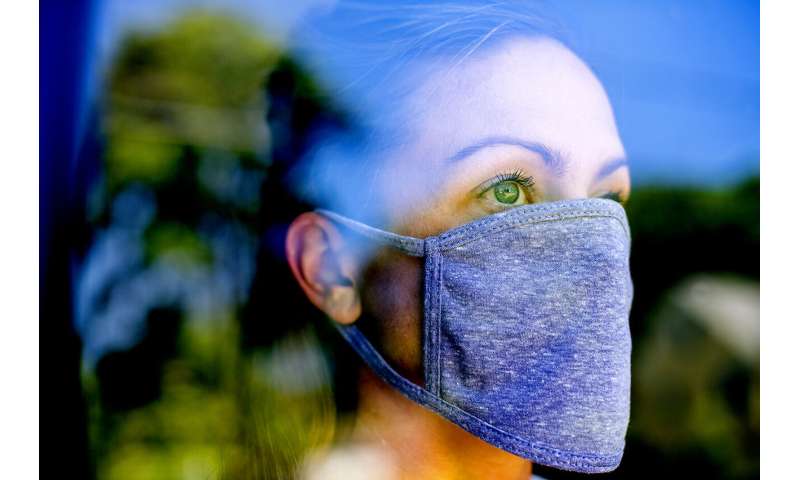Using cognitive psychology to fight COVID-19 misconceptions

There’s the idea that cloth masks don’t protect people from the coronavirus, so there’s no point in wearing them (hint: They do). That COVID-19 is just like the flu (it’s not). That it only affects old people (also no).
There are plenty of misconceptions about COVID-19, the disease caused by the SARS-CoV-2 coronavirus. And that’s especially true during a time when false information about the disease, the virus, and possible treatments is so hard to counteract.
Different misconceptions about the coronavirus—about how it gets transmitted, and how it leads to COVID-19 complications, for example—can result from a limited understanding of microbes and disease.
Misconceptions can also arise from a mix of different beliefs and ways of thinking that people inadvertently use when they try to make sense of things they don’t fully understand, says John Coley, an associate professor of psychology at Northeastern who has been studying those thinking modes for the past 10 years.
Coley calls them “intuitive knowledge,” and says they are useful shortcuts for learning under most circumstances.
But when it comes to learning about a new virus, that intuition can lead to important misconceptions even in people with formal scientific training, Coley says. To learn more about how that happens, Coley is leading a project to study how people’s thinking might be getting in the way of understanding the coronavirus and COVID-19.
“We are focusing on what emerges when your common-sense way of thinking about the world collides with whatever information you take in, either from the scientific community, Twitter, or whatever you’re running across,” Coley says, “and how that is going to be filtered through whatever your previous understandings and beliefs are.”
Coley recently teamed up with other researchers to study the types of intuitive knowledge that might be affecting the way first and second graders in the U.S. are learning about the coronavirus, with funding from the National Science Foundation. Children’s misconceptions could help researchers study how the reasoning of adults could be linked to their behavior and misconceptions of the pandemic, Coley says.
The team is also setting out to investigate ways to help children grapple with their incorrect understanding of COVID-19, and potentially also help adults understand how the coronavirus works. The plan is to develop online learning tools involving animated stories that explain the principles of viruses and counter potentially incorrect intuitive thinking about the coronavirus.
“We think teaching young children how the underlying mechanisms of viral disease work can help them not only know why they’re doing things like washing their hands and covering their face,” Coley says, “but allow them to make decisions in novel situations so they understand the underlying causal mechanisms of what’s going on.”
One type of intuitive knowledge Coley’s lab has studied before is known as anthropocentric thinking, which involves using what people know about humans to understand other living species. That kind of thinking also includes attributing human-like characteristics to other organisms (think pets and wildlife) and thinking that people are exempt from the natural rules that govern other species.
When it comes to science, Coley says, anthropocentric thinking can contribute to crucial misunderstandings.
“In one project we found that people consistently and systematically underestimate the impact of climate change on humans,” he says. “They’re willing to say that climate change is going to have a negative impact on lots of other kinds of plants and animals, but not on people—that people are sort of exempt from that.”
Another type of intuitive knowledge Coley has studied is how some people attribute an objective or purpose to the actions of an organism that isn’t motivated by a specific goal. That’s one example of teleological thinking, which, Coley says, people often use when they discuss antibiotic resistance.
People will often say that bacteria will mutate with the goal of becoming more resistant to an antibiotic. What is in fact happening is that bacteria that are immune to a treatment thrive more than the bacteria that are wiped out by the antibiotic. That’s just nature doing what nature does—survive. It’s not as though the bacteria were plotting to mutate all along—or a vicious coronavirus decimating the world, or a new hornet murdering everyone.
“These sorts of understandings might be a way to make information accessible to people and make it sort of appealing,” Coley says. “But on the other hand, we want to be careful to not instill misconceptions about how things work.”
Coley’s team includes researchers from the University of Toronto and Boston University, which have used picture books to teach children about Charles Darwin’s theory of evolution.
A tried-and-true scientific explanation for how living things have emerged and developed on Earth, evolution isn’t inherently complicated, Coley says. But depending on certain beliefs children might hold, it can be difficult for them to learn about evolution if it goes against what they believe.
And with COVID-19, he says, it is critical to recognize those intuitive ideas, point them out, and talk about them for what they are: really deep-set ways of understanding that won’t simply change with a patronizing conversation.
Source: Read Full Article



